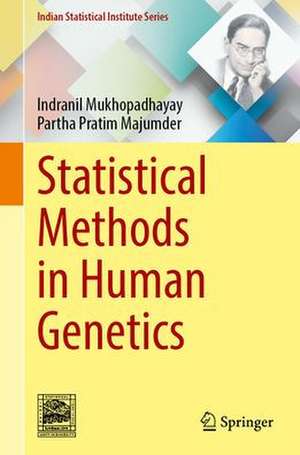Statistical Methods in Human Genetics: Indian Statistical Institute Series
Autor Indranil Mukhopadhyay, Partha Pratim Majumderen Limba Engleză Hardback – 11 oct 2023
Preț: 915.58 lei
Preț vechi: 963.76 lei
-5% Nou
Puncte Express: 1373
Preț estimativ în valută:
175.25€ • 190.43$ • 147.31£
175.25€ • 190.43$ • 147.31£
Carte disponibilă
Livrare economică 31 martie-14 aprilie
Preluare comenzi: 021 569.72.76
Specificații
ISBN-13: 9789819932191
ISBN-10: 981993219X
Pagini: 274
Ilustrații: XIV, 274 p. 40 illus., 16 illus. in color.
Dimensiuni: 155 x 235 mm
Greutate: 0.68 kg
Ediția:1st ed. 2023
Editura: Springer Nature Singapore
Colecția Springer
Seria Indian Statistical Institute Series
Locul publicării:Singapore, Singapore
ISBN-10: 981993219X
Pagini: 274
Ilustrații: XIV, 274 p. 40 illus., 16 illus. in color.
Dimensiuni: 155 x 235 mm
Greutate: 0.68 kg
Ediția:1st ed. 2023
Editura: Springer Nature Singapore
Colecția Springer
Seria Indian Statistical Institute Series
Locul publicării:Singapore, Singapore
Cuprins
Introduction to analysis of human genetic data.- Basic understanding of single gene expression data.- Basic probability theory and inference.- Analysis of single gene expression data.- Analysis of gene expression data in a dependent set up.- Tying genomes with disease.- Some extensions of genetic association study.- Exploring multivariate data.
Notă biografică
Indranil Mukhopadhyay is Professor at the Human Genetics Unit, Indian Statistical Institute, Kolkata, India. He has earned his Ph.D. from the University of Calcutta, Kolkata, India. With more than 50 research papers published in several national and international journals of repute, his research interests are in multi-loci genetic association study, data integration of several genetic datasets, single cell data analytics and mathematical statistics. He has considerable experience in teaching undergraduate- and graduate-level courses in statistical methods in human genetics and supervising the work of doctoral students working in this domain. He serves as Member of the Research Advisory Committee of ICAR-IASRI and Member of the International Biometric Society, the Indian Society of Human Genetics, the Indian Society for Medical Statistics, among others.
Partha Pratim Majumder is the founder of the National Institute of Biomedical Genomics, Kalyani, West Bengal, India. He is currently a National Science Chair of the Government of India. He concurrently holds academic positions in many national institutes. He serves on the governing boards and executive committees of the Human Genome Organisation, Human Cell Atlas and International Common Disease Alliance. Earlier he has served as Member of governance of the International Genetic Epidemiology Society, the Indian Society of Human Genetics, the Indian Society for Medical Statistics, the American Society of Human Genetics, among others. He is an elected Fellow of all science academies of India, the International Statistical Institute and The World Academy of Sciences. He has served as the President of the Indian Academy of Sciences. His research interests are in genetic epidemiology, human biomedical genomics, human genome diversity and evolution, and statistical genetics.
He has been awarded the G.N. Ramachandran Gold Medal (2021) by the CSIR; Barclay Memorial Medal (2020) byThe Asiatic Society; Sir P.C. Ray Memorial Medal (2020) by the University of Calcutta; Golden Jubilee Commemoration Medal (2018) by the Indian National Science Academy; Centenary Medal of Excellence (2014) by the School of Tropical Medicine; TWAS Prize in Biology (2009) of The World Academy of Sciences, Trieste; G.D. Birla Award for Scientific Research (2002) by the K.K. Birla Foundation, New Delhi and Kolkata; the Om Prakash Bhasin Award in Biotechnology (2001) by the Om Prakash Bhasin Foundation, New Delhi; the Ranbaxy Research Award in Applied Medical Sciences (2000) by the Ranbaxy Science Foundation, New Delhi; and the New Millennium Science Medal (2000) by the Indian Science Congress Association and the Council for Scientific and Industrial Research (CSIR), the Government of India.
Textul de pe ultima copertă
This book provides an overview of statistical concepts and basic methodology for the study of genetics of human traits and diseases. It attempts to provide a step-by-step description of problem identification, study design, methodology of data collection, data exploration, data summarization and visualization, and more advanced analytical methods for inferring genetic underpinnings of human phenotypes. The book provides codes in R programming language for implementation of most of the statistical methods described, which will enable practitioners to perform analysis of data on their own, without having to mold the data to fit the requirements of commercial statistical packages. Useful to anyone engaged in studies to understand and manage good health, the book is a useful guide for sustainable development of humankind. Primarily intended for practicing biologists especially those who carry out quantitative biological research, in particular, human geneticists, the book is also helpful in classroom teaching.
Caracteristici
Provides statistical methods for successful results in the fast-growing field of genetic epidemiology Uses statistical methods in areas of genetics and genomics and its relevance to other areas of biological science Collects the case studies based on real scientific phenomena and problems like illustrates














